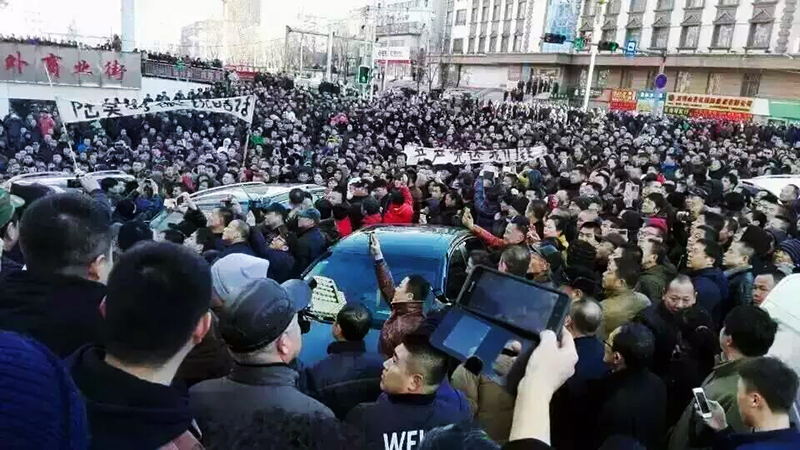After a week of strikes and protests, thousands of angry coal miners in the far northeast of China have forced the local government to pay months of wage arrears owed by their employer, the state-owned Longmay Group.
The protests in and around the city of Shuangyashan were triggered by claims made by Lu Hao, the governor of Heilongjiang, during a press conference at the National People’s Congress in Beijing, that none of Longmay’s employees were owed any back pay.
At least 1,000 people marched through the streets on 11 March holding banners reading “we must live, we must eat” and “Lu Hao is a liar,” and staged a protest in front of the Shuangyashan mining authority. See photo below.

Workers claimed they had not been fully paid since November: The last pay out was 50 percent of their January wage, which they only received in early March, they said.
The protests first broke out on 9 March in Dongrong district where three of Longmay’s pits that have been semi-idle for months on end are located. The protests quickly spread across the whole of Shuangyashan within two days. The wife of one miner explained that eight out of the ten pits in Shuangyashan are only partially operative, and as a result wages have been delayed, and when miners do get paid,most will only get about 3,000 yuan a month, about half of their former pay.
Workers above ground are in an even worse position with monthly wages of just 1,000 yuan, she said. In addition, the victims of work-related accidents have not been paid the compensation they are owed. “My husband lost a finger in 2014 and we haven’t seen any compensation yet. The mine said it had no money,” she added.
She noted that Longmay management never bothered to consult workers or the mine trade union on pay cuts and changes in working conditions. It was only on 12 March, when Lu Hao admitted that he had been mistaken about the wage arrears situation at Longmay that the local government finally promised to pay the wages owed for November and December.
By 15 March, workers said that most of their January wages had been paid and that their February wages would be paid soon.
Strikes and protests by China’s coal miners over wage arrears and layoffs have escalated over the last two years as the price and demand for coal has slumped. The coal industry has reported massive losses and there is little sign that the situation will improve in the near term. Meanwhile, miners all over China are still owed months of wages in arrears and protests are expected to continue well into this year.
